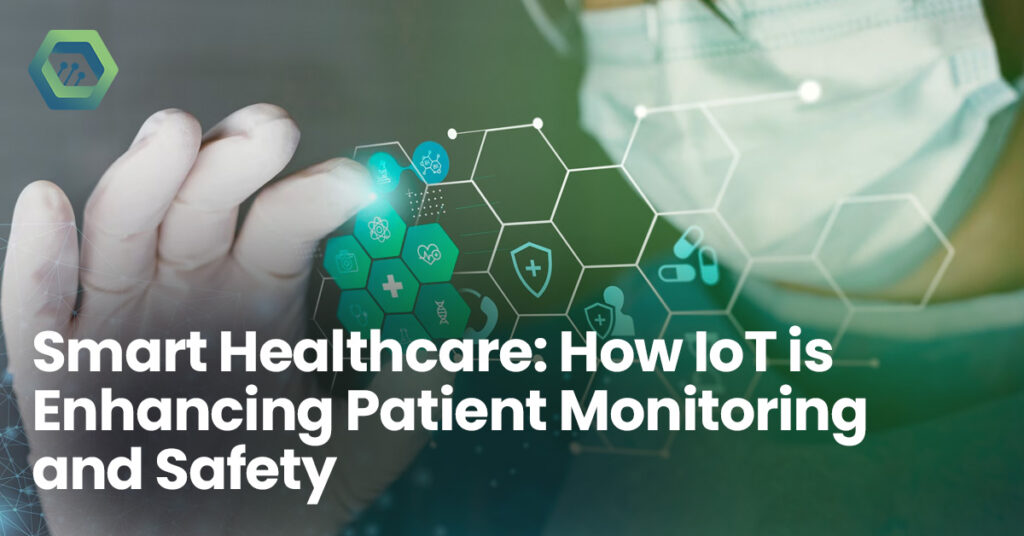The healthcare industry is undergoing a major transformation with the integration of Internet of Things (IoT) technology. IoT-powered smart healthcare solutions are revolutionizing patient monitoring, improving safety, and optimizing healthcare services. By leveraging real-time data collection, AI-driven analytics, and remote connectivity, healthcare providers can offer better, more efficient, and personalized care.
This blog explores how IoT is enhancing patient monitoring and safety, its key applications, benefits, and the future of smart healthcare.
What is IoT in Smart Healthcare?
IoT in healthcare refers to a network of connected medical devices, sensors, and cloud-based platforms that enable real-time monitoring, data sharing, and intelligent automation. These smart solutions help doctors, nurses, and caregivers track patient health remotely and respond proactively to medical emergencies.
Key Components of IoT-Powered Healthcare:
- Wearable Health Devices: Smartwatches, ECG monitors, and fitness trackers.
- Remote Patient Monitoring (RPM) Systems: Sensors that transmit vital signs in real time.
- AI & Predictive Analytics: Machine learning algorithms that detect anomalies and potential health risks.
- Cloud-Based Healthcare Platforms: Secure data storage and remote access to patient records.
- Smart Hospital Infrastructure: IoT-powered medical equipment and automated workflows.
Applications of IoT in Smart Healthcare
1. Remote Patient Monitoring (RPM)
IoT-enabled RPM systems allow healthcare providers to track patient health conditions outside hospitals, reducing the need for frequent hospital visits.
Key Benefits:
- Monitors heart rate, oxygen levels, blood pressure, and glucose levels in real time.
- Alerts doctors about potential health complications before they escalate.
- Enhances chronic disease management for conditions like diabetes and hypertension.
2. Smart Wearables for Health Tracking
Wearable devices equipped with IoT sensors track vital signs and provide real-time health insights to users and healthcare providers.
Key Benefits:
- Detects irregular heart rhythms and potential cardiac issues.
- Helps users maintain an active lifestyle with fitness tracking and sleep monitoring.
- Sends emergency alerts in case of falls or sudden health deterioration.
3. IoT-Powered Smart Hospitals
Smart hospitals use IoT-connected devices and automation to improve efficiency, reduce human error, and enhance patient care.
Key Benefits:
- Smart IV drips and medication dispensers prevent overdoses and underdoses.
- AI-powered patient tracking optimizes bed management and resource allocation.
- Automated sanitation systems reduce hospital-acquired infections.
4. IoT in Emergency Response & Critical Care
Connected healthcare systems speed up emergency response times and improve patient survival rates.
Key Benefits:
- IoT-enabled ambulances transmit real-time patient vitals to ER doctors before arrival.
- AI-powered predictive alerts help hospitals prepare for incoming emergencies.
- Wearable panic buttons enable elderly and disabled individuals to request immediate assistance.
5. Medication Adherence and Smart Pill Dispensers
Smart pill dispensers remind patients to take medications on time, reducing non-adherence risks.
Key Benefits:
- Tracks medication schedules and prevents missed doses.
- Notifies caregivers or doctors in case of non-compliance.
- Reduces medication errors and improves treatment effectiveness.
6. AI & Predictive Analytics in Healthcare
Machine learning algorithms analyze IoT data to detect health anomalies and predict diseases before they become critical.
Key Benefits:
- Identifies early warning signs of chronic illnesses and infections.
- Optimizes hospital resource management based on patient trends.
- Reduces hospital readmission rates with proactive care interventions.
Benefits of IoT in Healthcare
1. Improved Patient Safety & Care
IoT enables real-time health monitoring, ensuring that medical professionals can respond quickly to critical conditions.
2. Reduced Healthcare Costs
By preventing hospital readmissions and reducing emergency visits, IoT lowers healthcare expenses for both patients and providers.
3. Enhanced Chronic Disease Management
Continuous monitoring helps patients with chronic conditions maintain their health more effectively, leading to better long-term outcomes.
4. Increased Operational Efficiency
Smart hospitals automate administrative tasks, optimize resource allocation, and reduce manual errors.
5. Better Accessibility & Remote Healthcare
IoT-powered telemedicine and remote patient monitoring enable better healthcare access for rural and remote areas.
Challenges in IoT Healthcare Implementation
1. Data Security & Privacy Concerns
Healthcare data is highly sensitive. Ensuring secure IoT infrastructure is crucial to prevent cyber threats and breaches.
2. High Implementation Costs
Setting up IoT infrastructure requires significant investment in devices, cloud storage, and IT security.
3. Integration with Legacy Systems
Many healthcare providers still use outdated software, making IoT integration complex.
4. Regulatory Compliance & Standardization
Governments and healthcare agencies must establish clear IoT regulations to ensure safe and ethical implementation.
Future of IoT in Smart Healthcare
The future of IoT-powered healthcare is being shaped by advancements in AI, 5G, and blockchain technology. These innovations will further improve patient monitoring, security, and efficiency.
Emerging Trends in Smart Healthcare:
- 5G Connectivity for Faster Data Transmission.
- AI-Powered Digital Twins for real-time patient simulations.
- Blockchain for Secure Medical Records Management.
- Nano IoT Devices for implantable health monitoring.
Conclusion
IoT is transforming healthcare by enhancing patient monitoring, improving safety, and reducing costs. From wearables and remote monitoring to AI-driven analytics, smart healthcare solutions are making medical services more efficient and accessible.
As technology continues to evolve, IoT-driven healthcare innovations will lead to smarter, safer, and more connected medical ecosystems. To learn how OmniWOT’s IoT solutions can enhance your healthcare operations, visit our IoT Solutions Page.


